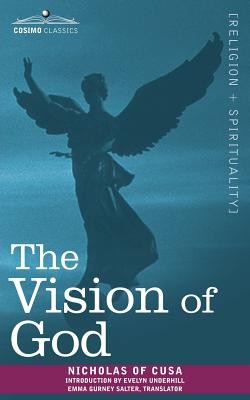
- We will send in 10–14 business days.
- Publisher: Cosimo Classics
- ISBN-10: 1602063265
- ISBN-13: 9781602063266
- Format: 12.7 x 20.3 x 1 cm, softcover
- Language: English
- SAVE -10% with code: EXTRA
The Vision of God (e-book) (used book) | bookbook.eu
Reviews
Description
Known for his deeply mystical writings about Christianity, Nicholas of Cusa wrote this, his most popular work, against a backdrop of widespread Church corruption. God, he believed, is found in all things, and thus cannot be perceived by man's senses and intellect alone. The path to ultimate knowledge, then, begins in recognizing our own ignorance. Deeply influenced by Saint Augustine, Nicholas mixes the metaphysical with the personal to create a deeply felt work, first published in 1453, designed to restore faith in even the most jaded. A German cardinal of the Roman Catholic Church, NICHOLAS OF CUSA (1401-1464) was a philosopher, jurist, mathematician, and astronomer. Also referred to as Nicolaus Cusanus and Nicholas of Kues, he is considered one of the great geniuses and polymaths of the 15th century. Among his other works are Writings on Church and Reform, Catholic Concordance, and Of Learned Ignorance.
EXTRA 10 % discount with code: EXTRA
The promotion ends in 9d.07:48:43
The discount code is valid when purchasing from 10 €. Discounts do not stack.
- Publisher: Cosimo Classics
- ISBN-10: 1602063265
- ISBN-13: 9781602063266
- Format: 12.7 x 20.3 x 1 cm, softcover
- Language: English English
Known for his deeply mystical writings about Christianity, Nicholas of Cusa wrote this, his most popular work, against a backdrop of widespread Church corruption. God, he believed, is found in all things, and thus cannot be perceived by man's senses and intellect alone. The path to ultimate knowledge, then, begins in recognizing our own ignorance. Deeply influenced by Saint Augustine, Nicholas mixes the metaphysical with the personal to create a deeply felt work, first published in 1453, designed to restore faith in even the most jaded. A German cardinal of the Roman Catholic Church, NICHOLAS OF CUSA (1401-1464) was a philosopher, jurist, mathematician, and astronomer. Also referred to as Nicolaus Cusanus and Nicholas of Kues, he is considered one of the great geniuses and polymaths of the 15th century. Among his other works are Writings on Church and Reform, Catholic Concordance, and Of Learned Ignorance.


Reviews